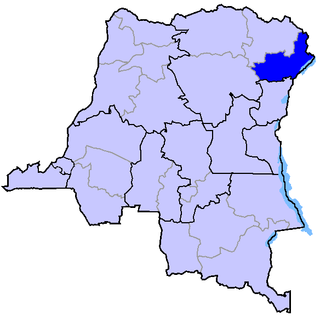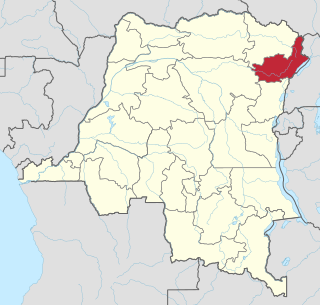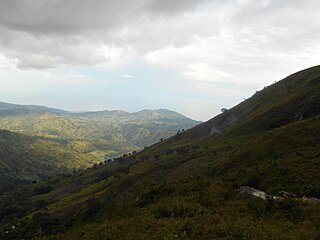Related Research Articles

The United Nations Organization Stabilization Mission in the Democratic Republic of the Congo or MONUSCO, an acronym based on its French name Mission de l'Organisation des Nations Unies pour la stabilisation en République démocratique du Congo, is a United Nations peacekeeping force in the Democratic Republic of the Congo (DRC) which was established by the United Nations Security Council in resolutions 1279 (1999) and 1291 (2000) to monitor the peace process of the Second Congo War, though much of its focus subsequently turned to the Ituri conflict, the Kivu conflict and the Dongo conflict. The mission was known as the United Nations Mission in the Democratic Republic of Congo or MONUC, an acronym of its French name Mission de l'Organisation des Nations Unies en République démocratique du Congo, until 2010.

The Nationalist and Integrationist Front is a rebel group active in the Ituri conflict in Ituri, Democratic Republic of the Congo, associated with the Lendu ethnic group. The FNI has fought against ethnic Hema and is blamed for the ambush and murder of nine United Nations peacekeepers near the town of Kafe in February 2005. FNI political leader Floribert Ndjabu was arrested by Congolese authorities, while military head Etienne Lona turned himself in.

The Ituri conflict is an ongoing low intensity asymmetrical conflict between the agriculturalist Lendu and pastoralist Hema ethnic groups in the Ituri region of the north-eastern Democratic Republic of the Congo (DRC). While the two groups had fought since as early as 1972, the name "Ituri conflict" refers to the period of intense violence between 1999 and 2003. Armed conflict continues to the present day.

Operation Artemis, formally European Union Force Democratic Republic of the Congo (EUFOR), was a short-term European Union-led UN-authorised military mission to the Democratic Republic of the Congo in 2003, during the Ituri conflict. ARTEMIS is considered the first military operation led by the EU, the first autonomous EU operation, the first rapid response mission of the EU, first operation outside Europe, first operation applying the principle of the framework nation and first example of "relay operation", conducted in cooperation between the EU and the United Nations. The deployment of EUFOR troops quickly decreased the conflict's intensity. It marked the first autonomous EU military mission outside Europe and an important milestone in development of the European Security and Defence Policy.

The Front for Patriotic Resistance in Ituri is a Bunia-based armed militia and political party primarily active in the south of the Ituri Province of northeastern Democratic Republic of the Congo.

The Kivu conflict is an umbrella term for a series of protracted armed conflicts in the North Kivu and South Kivu provinces in the eastern Democratic Republic of the Congo which have occurred since the end of the Second Congo War. Including neighboring Ituri province, there are more than 120 different armed groups active in the eastern Democratic Republic of Congo. Currently, some of the most active rebel groups include the Allied Democratic Forces, the Cooperative for the Development of the Congo, the March 23 Movement, and many local Mai Mai militias. In addition to rebel groups and the governmental FARDC troops, a number of national and international organizations have intervened militarily in the conflict, including the United Nations force known as MONUSCO, and an East African Community regional force.
The assault on Bogoro, which occurred on February 24, 2003, was an attack on the village of Bogoro in the Democratic Republic of the Congo (DRC) by the Nationalist and Integrationist Front (FNI) and the Front for Patriotic Resistance of Ituri (FRPI). The attackers allegedly went on an "indiscriminate killing spree", killing at least 200 civilians, imprisoning survivors in a room filled with corpses, and sexually enslaving women and girls. Two rebel leaders, Germain Katanga and Mathieu Ngudjolo Chui, have been charged by the International Criminal Court with war crimes and crimes against humanity over their alleged role in planning the attack.

The Peacekeepers is a 2005 documentary film directed by Paul Cowan, following the United Nations mission in the Democratic Republic of the Congo in the Democratic Republic of Congo between 2002 and 2004. The film portrays the attempts of UN Peacekeepers to avert a crisis similar to Rwanda in 1994. The film mixes footage from the actual conflict with that of UN officials behind the lines, to give a comprehensive portrayal of the conflict.
The 2020 Democratic Republic of the Congo attacks were a series of attacks which took place in 2020. The attacks were mostly carried out by the Allied Democratic Forces (ADF), a radical Islamist rebel group and the Cooperative for the Development of Congo (CODECO), an agricultural and religious group made up of ethnic Lendu people. The attacks left at least 1,316 people dead and 132 injured.
Muhammad Muhsin Alam, ndc, psc, is a brigadier general in the Bangladesh Army. He was the principal of BKSP in 2012 and served there for two years. Brigadier Alam commanded two infantry battalions of the Bangladesh Army. He also served as the brigade commander of an infantry brigade. He commanded of the only para commando brigade of the Bangladesh Army. He served at DRC as the Northern Sector Commander of MONUSCO.

CODECO is a loose association of various Lendu militia groups operating within the Democratic Republic of the Congo (DRC). The name is an abbreviation of the group's lesser-known full name, the Cooperative for Development of the Congo, sometimes also styled the Congo Economic Development Cooperative.
Attacks were carried out by various armed groups in the Democratic Republic of the Congo in 2021 and 2022. The attacks have killed 629 and injured 321. At least 82 perpetrators were also killed and one injured in these attacks.

Djugu territory is a district of Ituri, Democratic Republic of the Congo. Its capital is also named Djugu.
On 2 February 2022, over 60 civilians from the Hema ethnic group were killed in a massacre in Djugu territory, Ituri Province, Democratic Republic of the Congo.

Between January 24 and 26, 2023, M23 rebels and Armed Forces of the Democratic Republic of the Congo (FARDC) soldiers fought over the city of Kitshanga. The battle was part of the renewed M23 offensive, and ended on January 26 with M23 forces capturing the city. Civilians accused both M23 and FARDC-aligned militias of war crimes during and after the battle.
On the night between May 16 and 17, 2020, militants from the Lendu CODECO killed twenty-two civilians in the Hema village of Ndjala, in Ituri Province, Democratic Republic of the Congo.
The Ituri Self-Defense Popular Front, more commonly known as Zaïre-FPAC, is a decentralized Hema militant group or groups operating in the Democratic Republic of the Congo(DRC). They were formed in response to Cooperative for Development of the Congo (CODECO) expansions and the ongoing Ituri conflict. Fery little is known about the group, their organizational structure, or members. The group has committed several massacres and atrocities, and was "strongly condemned" by the United Nations in 2023 for their human rights abuses.
On October 24, 2020, militants from CODECO-ALC attacked Congolese and MONUSCO forces in the town of Dele, Ituri Province, Democratic Republic of the Congo. In response, Congolese forces launched an offensive against CODECO-ALC, capturing several towns from the group and killing its leader Mountain Wolf.
On the night between May 30 and 31, 2021, jihadists from the Allied Democratic Forces attacked the towns of Boga and Tchabi, killing a total of fifty-seven civilians and injuring forty-seven others. The attacks were one of the deadliest massacres ever perpetrated by the ADF since its founding in the 1990s.
References
- 1 2 3 4 AFP, Staff Writer With (2023-01-20). "DRC Militia Kills 7, Sparks Backlash Against UN Peacekeepers". The Defense Post. Retrieved 2024-01-17.
- ↑ "DR Congo emergency". UNHCR US. Retrieved 2024-01-17.
- 1 2 3 "Dozens of bodies found in mass graves in DR Congo". Al Jazeera. Retrieved 2024-01-17.
- ↑ "RDC-Ituri: Le groupe Zaïre/FPAC se transforme de plus en plus en un groupe armé organisé, avec un réseau de trafic d'armes en provenance d'Ouganda". Actualite.cd (in French). 2023-01-03. Retrieved 2024-01-17.
- 1 2 3 "Mass graves found in eastern DR Congo: UN". www.aa.com.tr. Retrieved 2024-01-17.
- 1 2 "UN peacekeepers find mass graves in eastern Congo". Reuters. January 19, 2023. Retrieved January 17, 2024.
- ↑ Serwat, Ladd (2023-02-03). "Regional Overview: Africa | January 2023". ACLED. Retrieved 2024-01-17.
- 1 2 "Est de la RDC: une manifestation contre la force régionale violemment réprimée". Actualite.cd (in French). 2023-01-18. Retrieved 2024-01-17.